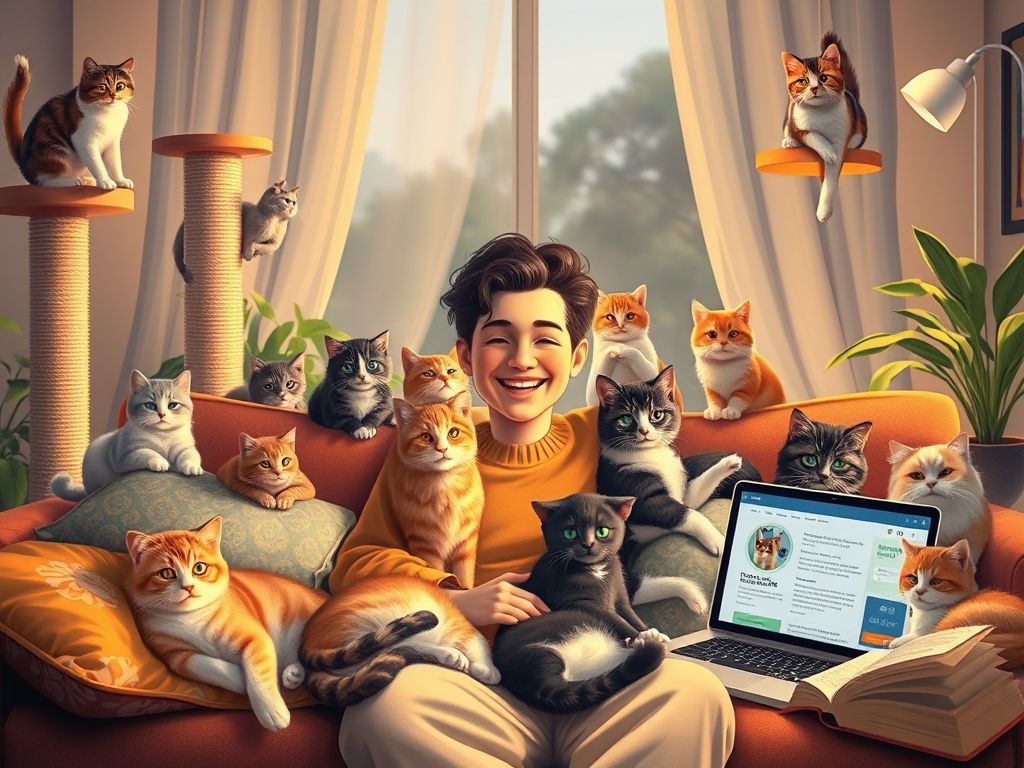
The Scientific Benefits of Being a Cat Lover
Research suggests that cats may make us happier and healthier.
August 8 is International Cat Day, but for cat lovers, every day is Cat Day. Cats wake us up at 4 a.m. to beg for breakfast and barf on that rug we just cleaned, yet around 23% of us are “cats only people” — not dog people, not even equal-opportunity cat and dog people.
In the United States, about 49 million homes have a cat. Why do we choose to bring these fluffy little beasties into our homes and spend an average of over $1,000 per year on them?
All the cat lovers out there probably don’t need scientific research to justify their fierce love. But scientists have studied it anyway and found that, while our feline friends may not always be good for our furniture, they likely contribute to our physical and mental health.
Well-being
Cats can improve your well-being by providing companionship and reducing loneliness, not to mention giving us a reason to laugh at their playful antics when they’ve had catnip or pounce on a new toy. Cat videos rule the internet for a reason, right?
If Millennials (aka the “wellness generation“) and Gen Z are any indication, cats are more a “part of the family” than ever before. Millennials make up the largest percentage of current pet owners, and 59% of them own at least one cat. In some countries, like Japan, more people own cats than dogs.
Many even throw birthday parties for their cats, and according to a 2024 survey, 82% of pet owners say their pets are “like their own child.” So, cats are creating a sense of joy and family for many people. Of course, a cat’s temperament does play a role in how close people feel to their felines.
Interacting with cats has positive effects on their owners’ brain. It improves mood and activates the prefrontal cortex and inferior frontal gyrus in the brain, contributing to physiological and psychological health.
In one older study, people with cats reported experiencing fewer negative emotions and feelings of seclusion than people without cats. In fact, single people with cats were often happier than people with a cat and a partner.
Similar to dogs, cats are honest, faithful, and don’t criticize us, no matter what we look like or what we’re going through — an ideal best friend. This helps us feel connected to other living beings in a way that might feel safer than being around certain people.
A 2024 study confirmed that people who have a pet (a dog or a cat) are generally much happier than those without.
Stress
Interacting with animals has been shown to decrease levels of cortisol (a stress-related hormone) and lower blood pressure.
In one older study, researchers visited 120 married couples in their homes to observe how they would respond to stress, and whether cats were any help.
Hooked up to heart rate and blood pressure monitors, people did a series of daunting tasks involving math problems and sticking their hands in a bowl of ice. People either sat in a room alone, with their pet roaming around, with their spouse (who could offer moral support), or both.
Before the stressful tasks began, the cat owners had a lower resting heart rate and blood pressure than people who didn’t own any pets. During the tasks, the cat owners were more likely to feel challenged than threatened, their heart rate and blood pressure were lower, and they even made fewer math errors.
Cat owners looked the calmest and made the fewest errors when their cat was present. They also recovered faster physiologically.
There’s actually an entire scientific scale that measures how much emotional support you get from your cat, based on how likely you are to seek them out in different stressful situations.
Even spending just 10 minutes interacting with a cat can reduce heart rate and blood pressure. This positive effect increases if you’ve owned your cat for more than 2 years.
Cats offer comfort and a distraction from our worries. But they’re also not a replacement for therapy or sometimes medication when you’re dealing with mental health issues. Despite how much we love the concept behind the novel “We’ll Prescribe You a Cat.”
Relationships
Domestic cats and humans care for each other (or at least we believe they do). This cross-species bonding may benefit our human-to-human relationships. For cat lovers, their cat/s can be part of their social network, and when someone — human or animal — makes us feel good and connected, it builds up our capacity for kindness and generosity toward others.
Research has found that cat-only owners are more open, imaginative, and curious. However, they may also tend to be more self-contained and introverted — though that’s not necessarily a bad thing.
Owning a cat may also help people with social anxiety by giving them a sense of routine and emotional support.
Health
It’s no secret that getting outside is good for you, and more cat owners are safely taking their indoor cats outdoors with the use of a harness and leash.
We might not all have an internet-famous adventure cat like Sigrid or Gary, but taking your cat into the yard in a well-fitted harness can be a great way to bond while getting some fresh air.
Another way in which cats can improve your health? That favorite sound in the world to every cat lover: Purring. When a cat purrs, it creates a consistent, patterned frequency between 25 and 150 Hertz.
Cats may purr to express hunger, affection, or stress. According to Dr. Leslie Lyons, director of the Feline Genetics and Comparative Medicine Laboratory at the University of Missouri College of Veterinary Medicine, purring at a low frequency of 25 to 50 Hz could stimulate muscles and even promote bone healing.
The next time your cat settles next to or on top of you while purring, it may be in self-repair mode, but it wouldn’t hurt for you to absorb some of that healing frequency, either.
Cats may also improve:
- cardiovascular health
- negative mood
- cortisol levels
- sympathetic nervous system
- oxytocin system
Though we need more objective studies, so far we know that cats can improve depression and provide social support, which can impact immune response and motivation to make positive health changes.
Reference: https://www.healthline.com/health/
- What to Know About Being Unable to Control Emotions

- Top 7 AI-Powered Wearables for Longevity and Biohacking in 2026

- Beginner’s guide to cryptocurrency trading strategies

- Hippies: The 1960s Youth Movement That Redefined Freedom, Peace, and Love

- What is soft skill? Definition, Importance, and Examples

- Get Your Vitamin P: Why Pleasure Matters When It Comes to What You Eat

ကိုယ်နဲ့တူတဲ့လူတွေများသား
ကြောင် တွေ ခွေးတွေနဲ့
အနီးကပ်သိပ်မနေတတ်ဘူး ဒီအတိုင်းသနားလို့ကျွေးတာလောက်ပဲ
ပြီးတော့ အရည်ပြားကလည်း ကိုယ့်ဆန်းဆန်းတင့်ဆိုတော့ 🥴🥺
🐈ma chit buu
ကောင်းပေးခဲ့ပါတယ်။
နှစ်သစ်မှာပျော်ရွှင်ကြပါစေ
တလရကြီးအောင်ရင် ဒီထက်ပိုပျော်ရမှာပါ။ 🥺
Thanks ❤️
I don’t usually hate them, but the smell of cats doesn’t bother me as much as the smell of dogs, so I’m closer to cats.
Thanks for your interesting topic.
Thanks
Thanks
I am not a cat lover 🤓
အိမ်မှာ သေးသေးလေး သုံးကောင် စိလယ် 🐈⬛🐈⬛🐈⬛
Thanks 👍👍
Thanks for sharing topic. 🐈⬛
😍😍🥰🥰🥰
So cute
တိလေးတွေကို အဝေးကပဲချစ်တတ်တယ် ပွေ့ပိုက်ပြီးယုယုယယမနေတတ်ဘူး
Cats are lovely,cutie pie!! 😻😽
Thanks for sharing this article.
Good morning all guys ❤️🌅
Cats 🐈 are lovely, but I don’t wanna raise them.
WS Minn…နော့ 🤝
ခွေးတွေ ကြောင်တွေ အကုန်သနားလို့ နိုင်သလောက် လျှောက်ကြွေးသော
🥰🥰🥰
I love pets but raising them is a lot of work. 😼😽😸 Thanks for your patience 😌
Thanks for your interesting topic
🐈⬛🐈⬛
ကြောင်အကိုက်ခံရတာ ဆေးထိုးလိုက်ရတယ်
ကြောင်တွေချစ်ဘူးလို့..